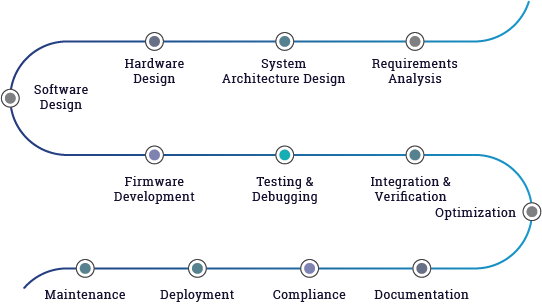Embedded Systems
Embedded systems are computer systems that are integrated into other products or devices to perform specific tasks. They are designed to operate in real-time, meaning that they must respond quickly to changing conditions and perform their functions without interruption.
At Silmates, we develop cutting-edge embedded systems for medical devices, ensuring real-time processing, precision, safety, and compliance. Our expertise spans across hardware and firmware development, real-time operating systems (RTOS), AI integration, IoT connectivity, cybersecurity, and regulatory compliance. We enable medical devices to deliver higher efficiency, reliability, and patient safety while meeting stringent FDA and ISO 13485 standards.
We specialize in custom embedded hardware, firmware, real-time processing, wireless communication, AI-powered analytics, and cybersecurity to deliver highly efficient and reliable medical devices that meet FDA, ISO 13485, and IEC 62304 standards.

Examples of embedded systems includes:-
Automotive systems: Computer systems in cars that control functions such as engine management, climate control, and entertainment systems.
Consumer electronics: Computer systems in products such as smartphones, laptops, and TVs that control the user interface, connectivity, and multimedia features.
Medical devices: Computer systems in devices such as heart monitors, blood glucose meters, and CT scanners that control the data acquisition and processing functions.
Industrial automation systems: Computer systems in machines such as assembly lines, robots, and process control systems that control the production process and monitoring of various parameters.
Military systems: Computer systems in military equipment such as missile guidance systems, unmanned aerial vehicles, and communication systems that control various functions and operate in harsh environments.
Embedded systems are typically designed to be small, low-power, and cost-effective, and to operate without user intervention. They may also be designed to be rugged and reliable, with redundant components to ensure continued operation in case of failures.
Embedded systems are becoming increasingly complex, with greater computing power and the ability to connect to other devices and systems. As a result, the development of embedded systems requires a deep understanding of the system requirements, as well as expertise in hardware and software design, and testing.
Process Flow Diagram

